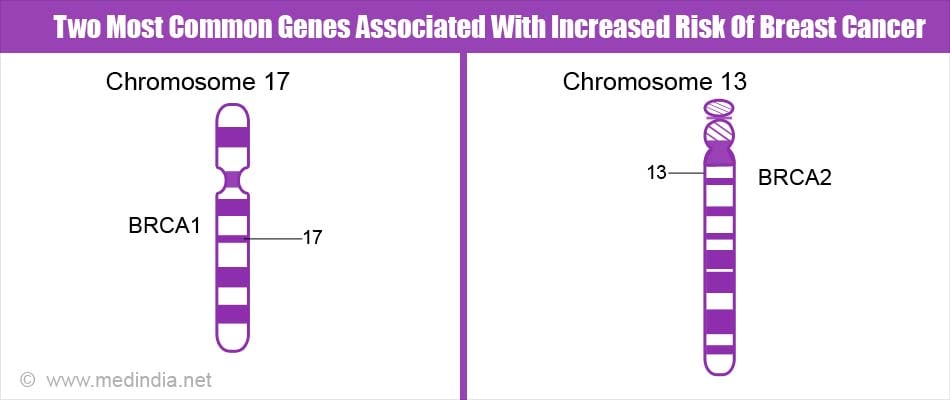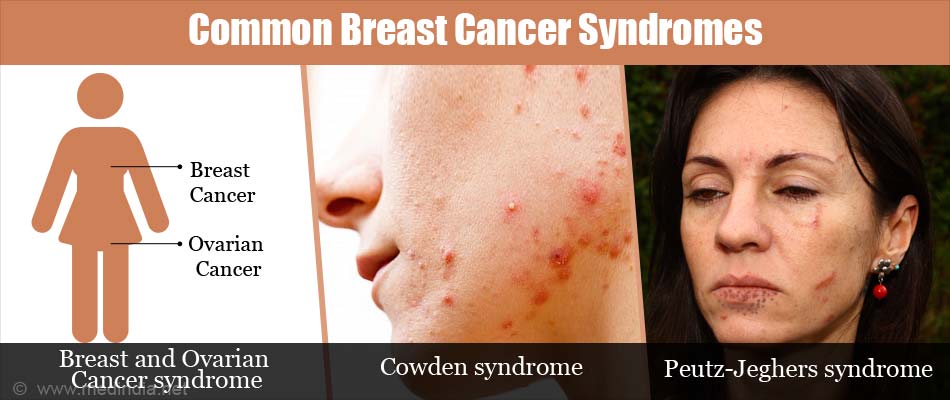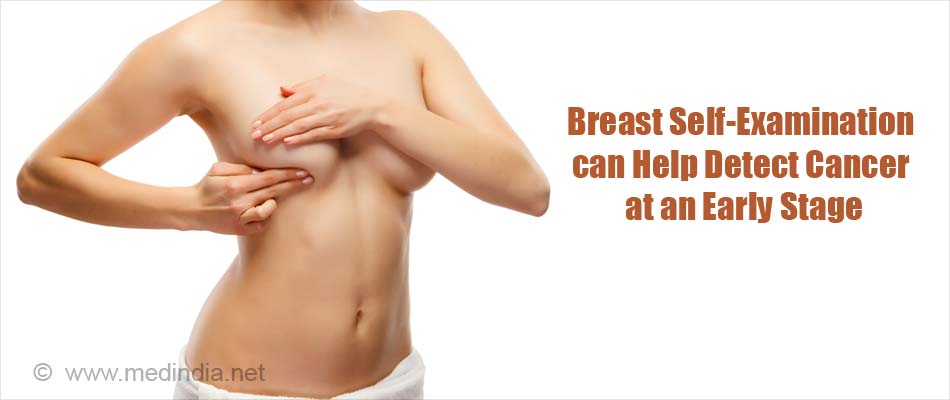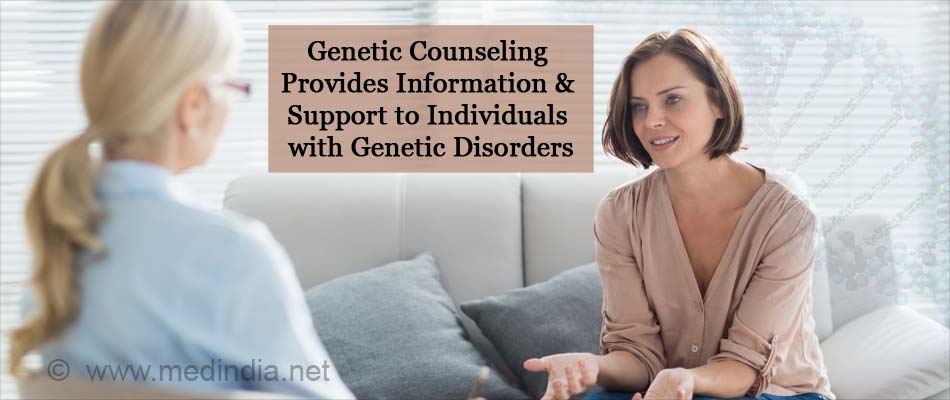- Gupta, S. (2016). Breast cancer: Indian experience, data, and evidence. South Asian Journal of Cancer, 5(3), 85-86. http://doi.org/10.4103/2278-330X.187552
- Malvia, S., Bagadi, S. A., Dubey, U. S. and Saxena, S. (2017), Epidemiology of breast cancer in Indian women. Asia-Pac J Clin Oncol. doi:10.1111/ajco.12661
- Family Cancer Syndromes - (https://www.cancer.org/cancer/cancer-causes/genetics/family-cancer-syndromes.html)
- Breast cancer - (https://ghr.nlm.nih.gov/condition/breast-cancer#genes)
- Genetics - Breast Cancer - (http://www.breastcancer.org/risk/factors/genetics)
What is Inherited Breast Cancer?
Breast cancer is currently the most common type of cancer that affects women worldwide. The number of Indian women affected with breast cancer is constantly on the rise. Breast cancer occurs when the cells in the breast grow abnormally without any restriction. This happens when there is a mutation (change or alteration or variation) in the genes that control the growth of these cells.
A gene mutation that predisposes a person to cancer is either acquired or inherited.
- Acquired gene mutations are those that occur in an individual’s lifetime due to the combination of environmental and lifestyle factors. These mutations are present only in the cancer cells.
- Inherited gene mutations are those that are passed down from the parents to the children and are present in all the cells of our body. Though inherited gene mutations are responsible for a much lesser number of cases as compared to acquired gene mutations, the risk of developing breast cancer is much higher in people who have an inherited gene mutation as compared to those who have acquired it in their lifetime. Individuals with inherited gene mutations that predispose to cancer are often affected by the cancer at an early age.
How is Breast Cancer Inherited?
Human beings have approximately twenty thousand genes in every cell of the body. These genes are like an instruction manual for the proper growth and functioning of the body. Mutations in these genes may negatively impact their functioning ability, thus resulting in health conditions like breast cancer. All genes are inherited in pairs, one from our mother and one from our father. These gene pairs are known as alleles. The inheritance pattern of a gene determines how the condition will be passed on in the family.
There are several genes that are linked to inherited breast cancer, and the inheritance pattern varies from gene to gene. Most of these genes are inherited in an autosomal dominant manner, while a few are inherited in an autosomal recessive manner.
Inheritance patterns
- Autosomal dominant: In autosomal dominant inheritance, a mutation in one allele of the gene pair is sufficient to cause the condition associated with that gene. Therefore, every individual who has a mutation in an autosomal dominant breast cancer gene is at an increased risk of being affected by breast cancer. Individuals, who have a mutation in a dominant gene, have a 50 percent chance of passing on this altered gene to each child.
- Recessive inheritance: In autosomal recessive inheritance, both alleles must be mutated to cause the condition associated with that gene. Individuals affected with a recessive condition will pass on one mutated allele to their children. Those who have a mutation in only one allele are known as carriers. Carriers are not affected by the condition but can pass on the mutated gene to their children.
Which Genes are Associated with Breast Cancer?
Currently, there are more than 10 genes known to be associated with inherited breast cancer. We all have these genes, but when one of these genes is altered, it increases the susceptibility to cancer. The risk and types of cancer are variable across the different genes.
BRCA1 and BRCA2
The two most common genes known to be associated with the increased risk of breast cancer are BRCA1 (BReast CAncer gene one) and BRCA2 (BReast CAncer gene two).
Approximately 10% of all breast cancer cases are due to mutations in BRCA1 and BRCA2 genes.

PTEN, CDH1, TP53, STK11, PALB2, ATM, CHEK2 and BIRP1 are some of the other genes that are also associated with hereditary breast cancer. The risk of breast cancer associated with these genes is higher than the general population risk but is lower than the risk associated with BRCA1 and BRCA2.
What are Breast Cancer Syndromes?
A breast cancer syndrome consists of certain cancers along with breast cancer that occur in a particular individual. It arises due to mutations that not only increase the risk of breast cancer but may also increase the risk of cancer in other organs.
There are several hereditary breast cancer syndromes. Each syndrome is associated with a unique set of genes. The type of breast cancer syndrome in a family is recognizable by identifying the cluster of cancers in the affected members of the family. In order to recognize a syndrome in the family, it is important to understand these syndromes.
Common Breast Cancer Syndromes
- Hereditary Breast and Ovarian Cancer syndrome (HBOC): HBOC is caused by mutations in BRCA1 or BRCA2 gene and is inherited in an autosomal dominant manner. The characteristic feature of HBOC is breast and/or ovarian cancers in women. Usually, these women are diagnosed with cancer at an early age and some women may be affected with more than one cancer. HBOC is also associated with fallopian tube cancer, pancreatic cancer, male breast, prostate cancer and some other cancers. The risk of cancer in men is much lower (8%) than the risk to women (80%).
- Cowden syndrome: Cowden syndrome is caused due to mutations in PTEN gene and is inherited in an autosomal dominant manner. It is associated with breast, ovarian, uterine and thyroid and colon cancers.
- Li-Fraumeni syndrome (LFS): LFS is a rare cancer syndrome associated with mutations in the TP53 gene. It is inherited in an autosomal dominant manner and is known to cause breast cancer, leukemia, brain tumors and sarcomas (cancer of the bones and connective tissue). Individuals with this syndrome are affected at very early ages. The lifetime risk of cancer in women with LFS is almost 100% and the risk to men is around 70%.
- Hereditary Diffuse Gastric Cancer syndrome (HDGC): HDGC is caused due to mutations in the CDH1 gene and is inherited in an autosomal dominant manner. HDGC causes a rare type of stomach cancer and/or breast cancer. The lifetime risk of cancer in women with HDGC syndrome is up to around 83% by the age of 80 years.
- Peutz-Jeghers syndrome: Peutz-Jeghers syndrome is often caused by mutations of the STK11 gene. It is inherited in an autosomal dominant pattern. It is associated with cancers of the gastrointestinal tract, pancreas, cervix, ovary, and breast.

Management of Hereditary Breast Cancer
The management of hereditary breast cancer involves the following:
- Risk assessment
- Genetic testing
- Cancer risk management
- Genetic counseling
Risk assessment
Risk assessment of hereditary cancer is based on the individual’s family history. Some of the points in the individual’s family history that could suggest the presence of a hereditary cancer in the family include the following:
- A woman affected by breast cancer below age 40.
- A woman affected by cancer in both breasts at any age.
- Two or more blood relatives with breast cancer below age 50.
- Breast and ovarian cancer in individuals from the same side of the family or in a single individual.
- A woman affected with ovarian cancer at any age.
- A man in the family with breast cancer.
Cancer risk management
Screening and management options are available for individuals diagnosed with or at-risk of a hereditary breast cancer syndrome. The recommendations for the management of the cancer risk vary according to the breast cancer syndrome in the family. These options help either to diagnose cancer at its early stages or to prevent cancer.
Options that help in early diagnosis:
- Self-breast examination every month.

- More frequent cancer screening which includes a combination of clinical examinations, MRI, and mammograms at periodic intervals.
Protective options that help reduce the risk of cancer:
- Prophylactic surgery – This is a preventive surgery in which healthy breasts or ovaries are removed. Prophylactic surgeries can reduce a woman’s risk of developing breast cancer by even up to 97%, especially when done before menopause. This is an option primarily for women who have a mutation in the BRCA1 or BRCA2 gene.
- Chemoprevention – Some drugs and vitamins can help reduce the risk of cancer in some women. However, the effect of this may vary in individuals.
- Lifestyle modifications – Living a healthy lifestyle can also reduce the risk or prolong the diagnosis of cancer. This includes maintaining a healthy weight, regular physical activity, eating a healthy diet, refraining from tobacco use and limiting alcohol intake.
Genetic testing
About Genetic Testing helps determine if an individual has a mutation in one of the genes associated with hereditary breast cancer. This is usually performed on a blood or saliva sample. However, genetic testing is complicated and may not be useful for everyone. Therefore, it is essential for an individual to talk to a genetic counselor before and after having a genetic test.
Genetic Counseling
It is globally recommended that individuals at risk of an inherited cancer syndrome must undergo genetic counseling. This helps them understand the condition, their cancer risk, genetic testing and screening options and risk to relatives. A genetic counselor helps individuals make informed decisions regarding genetic testing and management, and provides support during the entire process.

Health Tips
Breastfeeding: Breastfeeding reduces a woman’s risk of breast cancer. Therefore, it is essential that you breastfeed your children for the recommended duration.
Breast cancer screening: Breast cancer when detected early is easier to treat. Regular breast screening helps early detection of cancer. Breast cancer screening involves clinical breast examinations, mammograms, MRI and/or breast sonography at periodic intervals. The tests should be done only after consulting with your doctor.
Bilateral Salpingo-Oophorectomy (BSO): BSO is the surgical removal of both ovaries along with the fallopian tubes. A BSO in pre-menopausal women reduces their risk of breast cancer by half and the risk of ovarian cancer to a bare minimum.
Other cancer risks: It is important that you understand your risk of other cancers also. If you are at an increased risk of other cancers, understand the screening and preventive options and go for regular check-ups.






